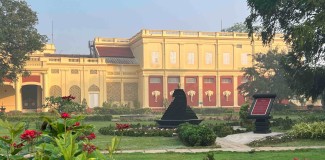International Theosophical Society, Adyar, India
The Theosophical Society is non-dogmatic, and Theosophists are encouraged to accept nothing on faith or on the word of another, but to adopt only those ideas that satisfy their sense of what is real and important. Theosophy is a way of looking at life rather than a
a dogma or religion. Modern Theosophy, however, presents ideas such as the following for our consideration, and many Theosophists hold these ideas, not as fixed beliefs, but as a way of looking at life that explains the world as they experience it:
- reincarnation,
- karma (or moral justice and harmony),
- the existence of worlds of experience beyond the physical,
- the presence of life and consciousness in all matter,
- the evolution of spirit and intelligence as well as of physical matter,
- the possibility of our conscious participation in evolution,
- the power of thought to affect one’s self and surroundings,
- the reality of free will and self-responsibility,
- the duty of altruism, a concern for the welfare of others, and
- the ultimate perfection of human nature, society, and life.
How is Theosophy applied practically? All members of the Theosophical Society decide what practices and manner of living are appropriate for them, but many Theosophists follow a certain regimen of life that is implied by Theosophical ideas like those above. They meditate regularly, both to gain insight into themselves and as a service to humanity. They are often vegetarians and avoid the use of furs or skins for which animals are killed. They support the rights of all human beings for fair and just treatment, being therefore supporters of women’s and minority rights. They respect differences of culture and support intellectual freedom. Theosophists are not asked to accept any opinion or adopt any practice that does not appeal to their inner sense of reason and morality.
What do Theosophists do in their meetings? Meetings typically consist of a presentation or study of material of interest, which includes or is followed by discussion or the study of a topic. Theosophy has no developed rituals, although meetings may be opened and closed by brief meditations or the recitation of short texts, and some groups use a simple ceremony for welcoming new members. There are no privileged symbols or icons in Theosophy, but various symbols from the religious traditions of the world are honoured, such as the interlaced triangles and the ankh (the Egyptian symbol of life). There are no clergy or leaders, other than democratically chosen officers.
How can you find out more? You can download a booklet called Exploring the Mysteries of Existence, which gives you some idea of areas that are studied. If you are interested in meeting some members, you can:
- Attend meetings at one of the local Centres in New Zealand. Our Centres welcome interested people to come along
- Watch some of our videos on our Youtube channel from past events
- Come to one of our National Events which are advertised on this website under Events
